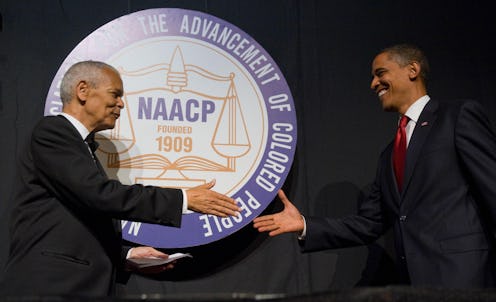News
Civil Rights Leader Julian Bond Has Died
Former chairman of the NAACP and leading 1960s civil rights figure, Julian Bond, died Saturday night, according to The New York Times. Bond was the Southern Poverty Law Center's first president, and the organization released a short statement, titled "We've lost a champion," saying Bond died in Fort Walton Beach, Florida, after a brief illness. Throughout his life, Bond was a writer, poet, television commentator, lecturer, professor at the University of Virginia and American University, and an activist against white supremacy, according to the Times.
Bond was one of the original leaders of the Student Nonviolent Coordinating Committee, and his young face became familiar to television viewers throughout the '60s and '70s, when he was described as "dashing, handsome, and urbane," according to the Times. Bond said he helped found the SNCC because he and other students felt that they could help call even more attention to the movement for racial equality, according to The Atlanta Journal-Constitution:
There were hundreds of black students like ourselves. We felt, we can do this too, as we had done it. We can keep this thing going.
After the Voting Rights Act of 1965 passed and black people were finally allowed to run for office, Bond was one of the first 11 black people elected to the Georgia House of Representatives, according to the Journal-Constitution. But Bond refused to quiet his activism as a member of the House. In 1966, just before he was seated, he voiced support for an SNCC statement that denounced U.S. involvement in the Vietnam War and was sympathetic toward evading the draft. Bond was accused by some members of the Georgia legislature of treason and disorderly conduct and House voted 184-12 to bar him from being seated.
Four days later, Martin Luther King, Jr. led 1,000 people to the Georgia capitol in a march protesting Bond's removal from office. Then — just when you thought he couldn't get anymore awesome — Bond took his case all the way to the Supreme Court, where he argued that his First Amendment rights had been violated in Bond v. Floyd, according to the Journal-Constitution. The Supreme Court voted unanimously in support of him.
He served 20 years in two houses of the Georgia legislature and helped create a majority-black congressional district in Atlanta, according to the Times. In 1986, he left the state senate after six terms to run for a seat in the U.S. House of Representatives. He lost to a friend and fellow civil rights champion John Lewis, a fellow founder and chairman of the SNCC. He later served as chairman of the NAACP from 1998 to 2010. In addition to teaching at American University and the University of Virginia, Bond has also lectured at Harvard, Williams, Drexel, and the University of Pennsylvania, according to the Times.
Atlanta Councilwoman Felicia Moore, a colleague of Bond’s son Michael Julian Bond, told the Journal-Constitution that Bond was "one of those figures you just expect to always be around and continue to fight for equality and justice for all people."
The SPLC's said in its statement that "we lost a tireless champion for civil and human rights":
With Julian's passing, the country has lost one of its most passionate and eloquent voices for the cause of justice. He advocated not just for African Americans, but for every group, indeed every person subject to oppression and discrimination, because he recognized the common humanity in us all.
Bond is survived by his wife and former SPLC attorney, Pamela Horowitz, and his five children, according to TIME.
